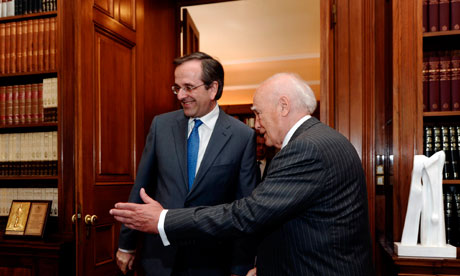Helena Smith in Athens guardian.co.uk, Monday 7 May 2012 23.05 BST
Possibility of repeat elections after Antonis Samaras, leader of the New Democracy party, fails to form a government
Antonis Samaras, leader of New Democracy party, was invited by President Karolos Papoulias to form a coalition government. Photograph: Reuters
Attempts to form a new government in Athens have collapsed after the leader of the centre-right New Democracy party announced that he was unable to form a coalition in the crisis-hit country.
"We did whatever was possible," Antonis Samaras told Greeks in a national address, saying he had reached out to every party with the exception of the far-right Chrysi Avgi (Golden Dawn), which was catapulted into parliament in Sunday's election.
Samaras's party won 18% of the vote, the largest share of any single party although significantly lower than the 33.5% it won in the last election three years ago. The mandate to try to form a government now falls to the surprise runner-up, Alexis Tsipras, the leader of the leftist coalition Syriza, which received 16.78% of the vote.
The poll saw millions of voters deserting mainstream parties for hardline anti-austerity groups, leaving the New Democracy party far short of the majority required to govern alone.
Tsipras increased the possibility of Greece having to conduct repeat elections, a prospect that would throw the country into ever deeper tumult, when he rejected attempts by Samaras to form a coalition. "The campaign positions of Mr Samaras are at the opposite end of the alternative proposals of a leftwing government," he said after holding talks for 40 minutes with the New Democracy leader on Monday.
"There can be no 'government of national salvation' as [Samaras] has called it because his signatures and commitments to the loan agreement do not constitute salvation but a tragedy for the people and the country."
Samaras had similar talks with socialist leader Evangelos Venizelos. The former finance minister, whose Pasok party was also pummelled in the polls, said co-operation would "depend exclusively" on the conservative Samaras being able to convince a third party to join the coalition.
A spokesman for Syriza told Greek TV: "Our aim is form a government of the left that will liberate the country from the shameful loan agreement it has signed up to."
While the ballot has been interpreted as a referendum on the austerity measures imposed over the past two years in an attempt to deal with Athens's parlous public finances, it has also cast doubt over the country's eurozone membership.
Raising the pressure, the German chancellor, Angela Merkel, said on Monday she expected Greece to continue to commit itself to the tough conditions of the two financial support packages it had signed up to. Berlin, which has bankrolled most of those programmes so far, would work with any democratically elected Greek government, she said.
But, she insisted, "the most important thing is that the programmes we agreed with Greece will be continued".
The outgoing prime minister, Lucas Papademos, added to the mounting sense of urgency by saying it was critical that the sacrifices Greeks had made in the form of tax rises and pay and pension cuts were "not lost".
Tsipras on Monday reiterated that his aim was to form a "united left front" that would annul the controversial loan agreement keeping the debt-stricken economy afloat. If he failed, the mandate would be given to Venizelos.
But defiance is in the air. As dependent as Athens is on rescue funds, anti-austerity fury is now driving Greek politics. In a climate of escalating hostility towards Europe and Germany in particular, it remains far from certain how, or if, it can toe the line and keep to the economic strategy demanded by its creditors.
The tectonic shift in the country's political landscape, following the dramatic drop in support for New Democracy and Pasok – the two parties that had supported the EU/IMF bailout in a left-right administration led by Papademos since November – has imbued Greek politics with a new and unpredictable edginess, analysts say.
Relentless rounds of wage and pension cuts, tax increases and benefit losses have not only deepened the country's five-year recession, sending unemployment to historic levels with an unprecedented 21% of Greeks now out of work, but pushed the nation to its limits.
The spectacular showing in the polls of Syriza and the far-right, ultra-nationalist Chrysi Avgi, which won 7% of the vote, is proof that, one way or another, Greeks were bent on venting their spleen.
"Essentially, the cry of the poll is the last reaction before the despairing and destroyed lower-middle classes are driven to more violent reactions," wrote prominent commentator Stavros Lygeros in the authoritative Kathimerini newspaper. "[Reactions] that could ignite a blind, violent social explosion."
Highlighting the uncertainty, other groups that had campaigned against the unpopular "growth through austerity" policies refused to cooperate with either one of the "pro-bailout" parties within minutes of the first exit polls.
"They are 'yes' men who sign whatever Merkel and her finance minister [Wolfgang] Schauble say," said Panos Kammenos, the leader of the conservative breakaway Independent Greeks party which picked up 10,6% of the vote barely three months after it was founded. "Not even dead would we participate with them."
With the rhetoric at such levels, the political impasse in Greece does not look set to end soon.
Greece: leaders fail to form a coalition | World news | The Guardian
![The [Greek] European Tragedy](https://blogger.googleusercontent.com/img/b/R29vZ2xl/AVvXsEiWKI5s90SFm1wWTk6bs4p7CgslaC2SnYPsrZhb-B-smOufNNCSxCvpBLI9hOB-LsXZjir_PNmEiMk2-E62F3xkg96IoC6QFAaZAnPRTVH340IN9WBRmWJqPkjWlgyRj3zpALp7h6hvA58/s920/GkBack_new.jpg)
